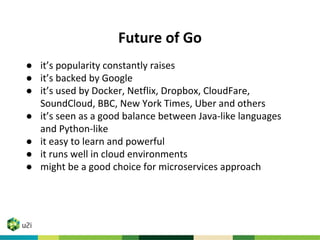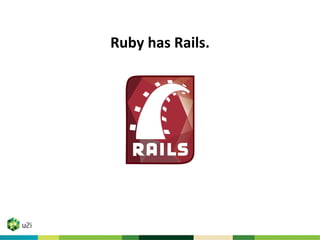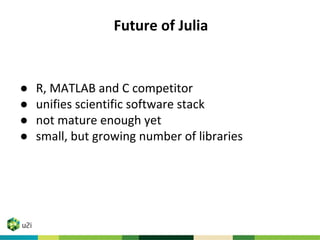Ruby is dying. What languages are cool now?
- 1. Ruby is dying What languages are cool now? Michał Konarski u2i.com
- 2. Seriously, is Ruby dying?
- 4. But let’s look from a different angle...
- 6. Well, not exactly. But what languages are cool now?
- 7. Let’s look at six of them
- 8. Swift
- 9. Swift ● designed by Apple ● released in 2014 ● created for iOS, macOS, tvOS ● multi-paradigm ● statically, strongly typed ● compiled
- 10. namespacesgenerics closures tuples operator overloading native collections type inference pattern matching multiple return types Read-Eval-Print-Loop (REPL) Swift features
- 11. Nothing really outstanding. So, what’s the story behind Swift?
- 12. “We absolutely loved Objective-C, but we had to ask ourselves a question - what would it be like if we had Objective-C without the baggage of C?” Tim Cook
- 13. It’s mainly because Objective-C is bad. And they had nothing else.
- 14. @interface Foo : NSObject @property (readonly) int bar; - (instancetype)initWithBar:(int)bar; + (instancetype)fooWithBar:(int)bar; @end @implementation Foo - (instancetype)initWithBar:(int)bar { self = [super init]; if (self) { _bar = bar; } return self; } + (instancetype)fooWithBar:(int)bar { return [[self alloc] initWithBar:bar]; } @end How bad is Objective-C? http://www.antonzherdev.com/post/70064588471/top-13-worst-things-about-objective-c
- 15. Swift is easier to read Objective-C if (myDelegate != nil) { if ([myDelegate respondsToSelector: @selector(scrollViewDidScroll:)]) { [myDelegate scrollViewDidScroll:myScrollView] } } Swift myDelegate?.scrollViewDidScroll?(myScrollView)
- 16. Why also Swift is better? ● no need to have two separate files (code and headers) ● it’s safer (runtime crash on null pointer) ● it has automatic ARC (Automatic Reference Counting) ● it’s faster ● it requires less code ● it has namespaces
- 17. It’s not only a language XCode 8 https://developer.apple.com/xcode/
- 18. It’s not only a language Swift Playgrounds http://www.apple.com/swift/playgrounds/
- 20. ● sponsored by Mozilla ● announced in 2010 ● first release in 2012 ● stable release in 2015 ● statically, strongly typed ● multi-paradigm ● compiled
- 21. “The goal of the project is to design and implement a safe, concurrent, practical systems language” Rust FAQ
- 22. There are not such languages? Apparently not.
- 23. Current languages are wrong ● there is too little attention paid to safety ● they have poor concurrency support ● they offer limited control over resources ● they stick too much to paradigm
- 24. So let’s create a new high-low level language!
- 25. Rust is a high level language! ● generics ● traits ● pattern matching ● closures ● type inference ● automatic memory allocation and deallocation ● guaranteed memory safety ● threads without data races
- 26. Rust is a low level language! ● no garbage collector ● manual memory management ● zero-cost abstractions ● minimal runtime ● as fast as C/C++
- 27. Guaranteed memory safety? How?
- 28. Ownership fn foo() { let v1 = vec![1, 2, 3]; let v2 = v1; println!("v1[0] is: {}", v1[0]); } error: use of moved value: `v
- 29. You can’t have two references to the same object!
- 30. Ownership stack heap [1, 2, 3] v1 v2
- 31. There are more such mechanisms.
- 32. Future of Rust ● currently two big projects: servo and rust ● other smaller projects: redox, cgmath, Iron, rust-doom ● it changes very quickly ● it has a good opinion in the community ● it will be hard to replace C/C++ ● It has a steep learning curve
- 33. Go
- 34. Go ● designed in Google in 2007 ● first release in 2009 ● stable release in 2016 ● statically, strongly typed ● multi-paradigm, concurrent ● compiled
- 35. Standard languages (Java, C++) ● are very strong: type-safe, effective, efficient ● great in hands of experts ● used to build huge systems and companies
- 36. Standard languages (Java, C++) ● hard to use ● compilers are slow ● binaries are huge ● desperately need language-aware tools ● poorly adapt to clouds, multicore CPUs
- 37. Simpler languages (Python, Ruby, JS) ● easier to learn ● dynamically typed (fewer keystrokes) ● interpreted (no compiler to wait for) ● good tools (interpreters make things easier)
- 38. Simpler languages (Python, Ruby, JS) ● slow ● not type-safe ● hard to maintain in a big project ● very poor at scale ● not very modern
- 39. What if we had a static language with dynamic-like syntax?
- 40. A niche for a language ● understandable ● statically typed ● productive and readable ● fast to work in ● scales well ● doesn't require tools, but supports them well ● good at networking and multiprocessing
- 41. Features of Go ● syntax typical for dynamic languages ● type inference ● fast compilation ● garbage collector ● memory safety features ● built-in concurrency ● object oriented without classes and inheritance ● lack of generics ● compiles to small statically linked binaries
- 42. Interfaces type Animal interface { Speak() string } type Dog struct { } func (d Dog) Speak() string { return "Woof!" } func SaySomething(a Animal) { fmt.Println(a.Speak()) } func main() { dog := Dog{} SaySomething(dog) }
- 44. Goroutines func main() { go expensiveComputation(x, y, z) anotherExpensiveComputation(a, b, c) }
- 45. Channels func main() { ch := make(chan int) go expensiveComputation(x, y, z, ch) v2 := anotherExpensiveComputation(a, b, c) v1 := <- ch fmt.Println(v1, v2) }
- 46. Future of Go ● it’s popularity constantly raises ● it’s backed by Google ● it’s used by Docker, Netflix, Dropbox, CloudFare, SoundCloud, BBC, New York Times, Uber and others ● it’s seen as a good balance between Java-like languages and Python-like ● it easy to learn and powerful ● it runs well in cloud environments ● might be a good choice for microservices approach
- 48. ● created by José Valim ● released in 2012 ● functional ● dynamically, strongly typed ● compiled to Erlang VM byte code
- 50. Elixir = Erlang with Ruby syntax
- 51. Elixir features ● massively concurrent ● scalable ● fault-tolerant ● great performance ● functional, but practical ● nice Ruby-like syntax ● metaprogramming via macros
- 52. Ruby has Rails.
- 54. Controllers in Rails class PagesController < ApplicationController def index @title = params[:title] @members = [ {name: "Chris McCord"}, {name: "Matt Sears"}, {name: "David Stump"}, {name: "Ricardo Thompson"} ] render "index" end end http://www.littlelines.com/blog/2014/07/08/elixir-vs-ruby-showdown-phoenix-vs-rails/
- 55. Controllers in Phoenix defmodule Benchmarker.Controllers.Pages do use Phoenix.Controller def index(conn, %{"title" => title}) do render conn, "index", title: title, members: [ %{name: "Chris McCord"}, %{name: "Matt Sears"}, %{name: "David Stump"}, %{name: "Ricardo Thompson"} ] end end http://www.littlelines.com/blog/2014/07/08/elixir-vs-ruby-showdown-phoenix-vs-rails/
- 56. Future of Elixir ● new Erlang for the masses ● fits highly concurrent niche ● attracts Ruby developers ● no big company behind ● used by Pinterest ● will fly on the wings of Phoenix?
- 58. ● created by data scientists ● released in 2012 ● dynamically, strongly typed ● compiled
- 59. Compiled one for fast stuff. Interpreted one for visualisation. Data scientists’ two languages problem:
- 60. Julia features ● solves scientists’ two language problem ● familiar syntax ● extensive scientific library ● user-defined types ● multiple dispatch ● built-in parallelism ● good performance (comparing to C)
- 61. Single dispatch (Ruby) a.do_something(b, c) Only a decides which method to choose.
- 62. Multiple dispatch julia> f(x::Float64, y::Float64) = 2x + y; julia> f(2.0, 3.0) 7.0 julia> f(2.0, 3) ERROR: MethodError: `f` has no method matching Here everything decides!
- 63. Future of Julia ● R, MATLAB and C competitor ● unifies scientific software stack ● not mature enough yet ● small, but growing number of libraries
- 65. ● created by Google ● released in 2011 ● optionally typed ● interpreted ● translated to JavaScript
- 67. Dart vs JavaScript ● class-based (not prototype-based) ● normal foreach ● named parameters ● operator overriding ● string interpolation ● optional typing ● false is false ● easy DOM operations
- 68. Looks familiar class Point { num x; num y; Point(this.x, this.y); distanceFromOrigin() { return sqrt(x * x + y * y); } } main() { var p = new Point(2, 3); print(p.distanceFromOrigin()); }
- 69. Cascade operator querySelector('#button') ..text = 'Confirm' ..classes.add('important') ..onClick.listen( (e) => window.alert('Confirmed!'));
- 70. Future of Dart ● 2016 AdWord UI built in Dart ● no Dart VM in browsers ● fragmented community ● client-side future is dim ● backend future looks much better
- 72. Sources ● developer.apple.com/swift ● rust-lang.org ● golang.org ● elixir-lang.org ● julialang.org ● dartlang.org













![@interface Foo : NSObject
@property (readonly) int bar;
- (instancetype)initWithBar:(int)bar;
+ (instancetype)fooWithBar:(int)bar;
@end
@implementation Foo
- (instancetype)initWithBar:(int)bar {
self = [super init];
if (self) {
_bar = bar;
}
return self;
}
+ (instancetype)fooWithBar:(int)bar {
return [[self alloc] initWithBar:bar];
}
@end
How bad is Objective-C?
http://www.antonzherdev.com/post/70064588471/top-13-worst-things-about-objective-c](https://image.slidesharecdn.com/coollanguagesscreencast-160704112028/85/Ruby-is-dying-What-languages-are-cool-now-14-320.jpg)
![Swift is easier to read
Objective-C
if (myDelegate != nil) {
if ([myDelegate respondsToSelector:
@selector(scrollViewDidScroll:)]) {
[myDelegate scrollViewDidScroll:myScrollView]
}
}
Swift
myDelegate?.scrollViewDidScroll?(myScrollView)](https://image.slidesharecdn.com/coollanguagesscreencast-160704112028/85/Ruby-is-dying-What-languages-are-cool-now-15-320.jpg)












![Ownership
fn foo() {
let v1 = vec![1, 2, 3];
let v2 = v1;
println!("v1[0] is: {}", v1[0]);
}
error: use of moved value: `v](https://image.slidesharecdn.com/coollanguagesscreencast-160704112028/85/Ruby-is-dying-What-languages-are-cool-now-28-320.jpg)

![Ownership
stack heap
[1, 2, 3]
v1
v2](https://image.slidesharecdn.com/coollanguagesscreencast-160704112028/85/Ruby-is-dying-What-languages-are-cool-now-30-320.jpg)























![Controllers in Rails
class PagesController < ApplicationController
def index
@title = params[:title]
@members = [
{name: "Chris McCord"},
{name: "Matt Sears"},
{name: "David Stump"},
{name: "Ricardo Thompson"}
]
render "index"
end
end
http://www.littlelines.com/blog/2014/07/08/elixir-vs-ruby-showdown-phoenix-vs-rails/](https://image.slidesharecdn.com/coollanguagesscreencast-160704112028/85/Ruby-is-dying-What-languages-are-cool-now-54-320.jpg)
![Controllers in Phoenix
defmodule Benchmarker.Controllers.Pages do
use Phoenix.Controller
def index(conn, %{"title" => title}) do
render conn, "index", title: title, members: [
%{name: "Chris McCord"},
%{name: "Matt Sears"},
%{name: "David Stump"},
%{name: "Ricardo Thompson"}
]
end
end
http://www.littlelines.com/blog/2014/07/08/elixir-vs-ruby-showdown-phoenix-vs-rails/](https://image.slidesharecdn.com/coollanguagesscreencast-160704112028/85/Ruby-is-dying-What-languages-are-cool-now-55-320.jpg)

















